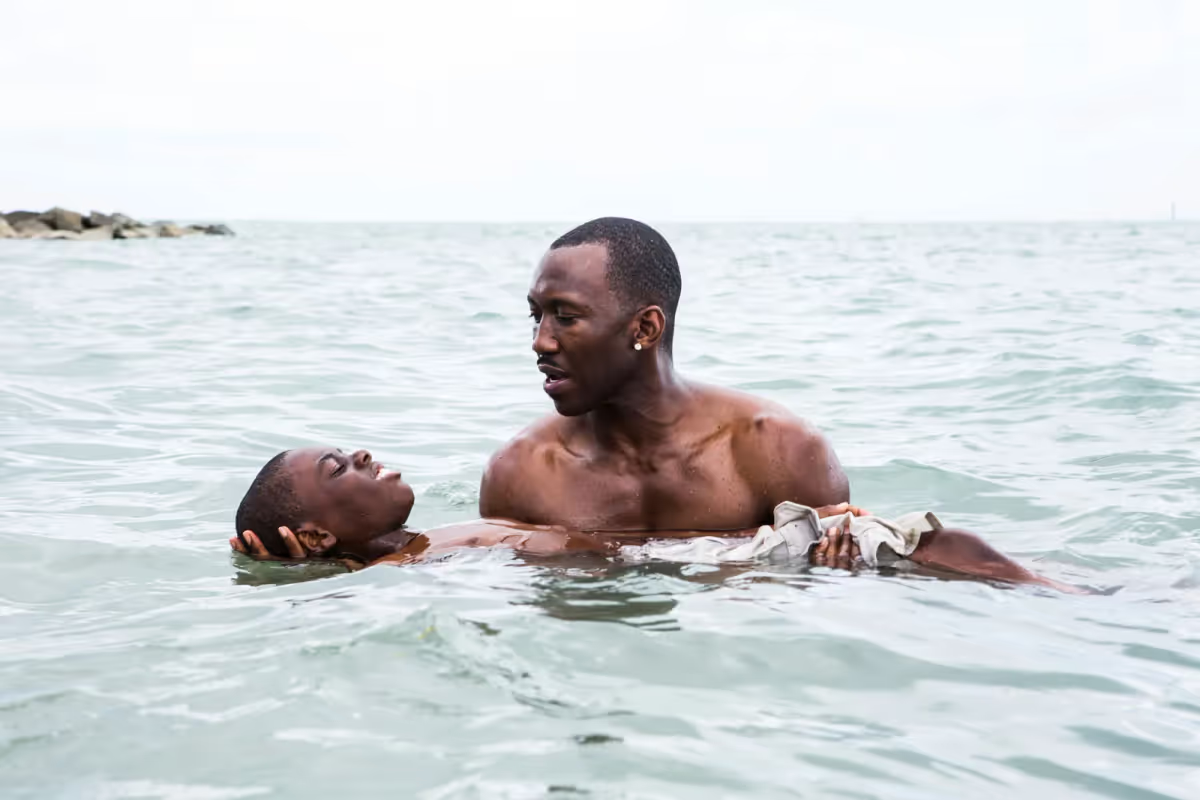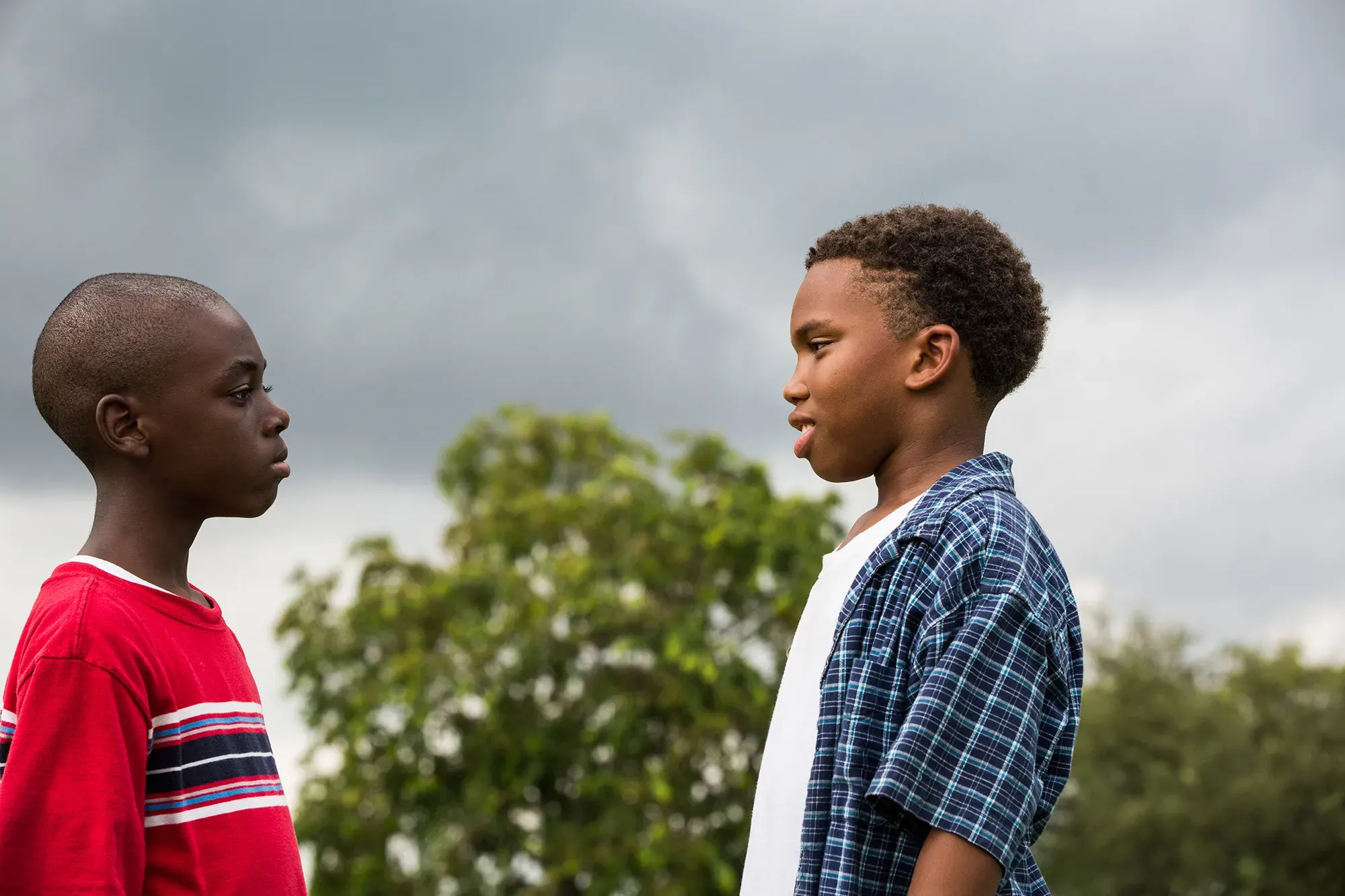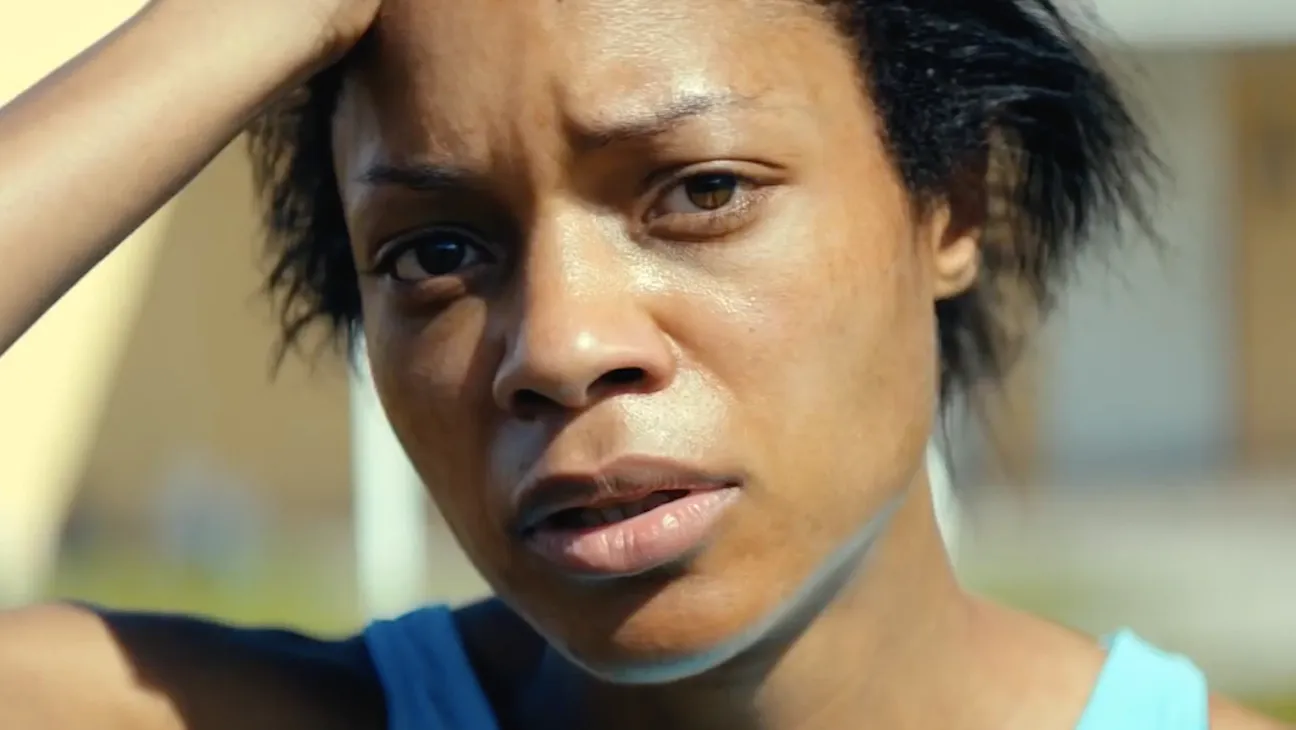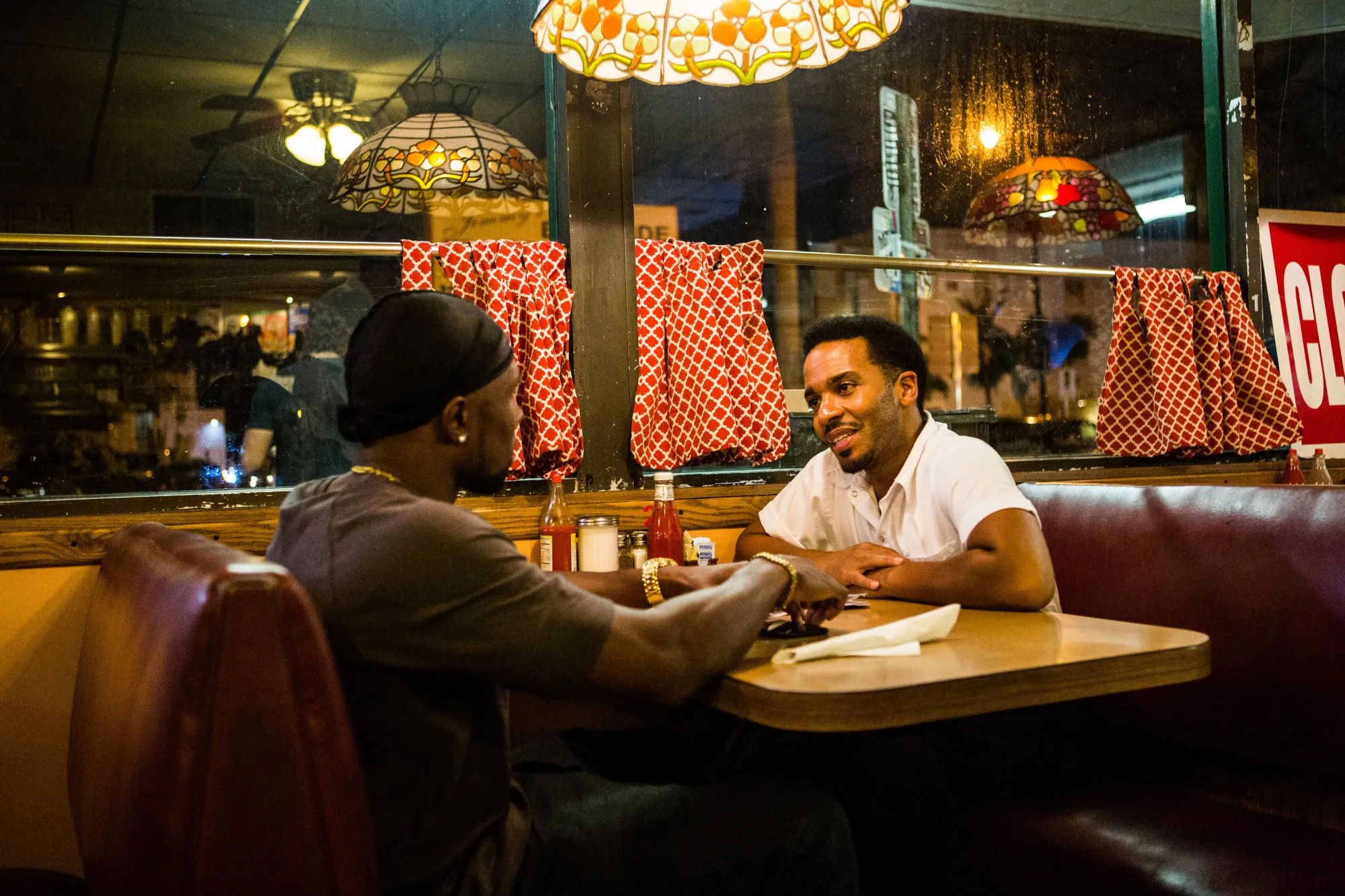#60 (tie): 'Moonlight': The Reveal discusses all 100 of Sight & Sound’s Greatest Films of All Time
Barry Jenkins' second film explores yearning, addiction, sadness, and resilience via a lyrical coming-of-age story set against the backdrop of Miami.

On December 1st, 2022, Sight & Sound magazine published “The Greatest Films of All Time,” a poll that’s been updated every 10 years since Bicycle Thieves topped the list in 1952. It is the closest thing movies have to a canon, with each edition reflecting the evolving taste of critics and changes in the culture at large. It’s also a nice checklist of essential cinema. Over the course of many weeks, months, and (likely) years, we’re running through the ranked list in reverse order and digging into the films as deep as we can. We hope you will take this journey with us.
Moonlight (2016)
Dir. Barry Jenkins
Ranking: #60 (tie)
Previous ranking: N/A
Premise: A film in three parts, each depicting episodes in the life of a protagonist named Chiron, Barry Jenkins’ adaptation of an unproduced play written by Tarell Alvin McCraney opens in the Miami neighborhood of Liberty City. The year remains unnamed but the effects of the crack epidemic are evident wherever the young Chiron (Alex R. Hibbert), nicknamed “Little,” goes. Bullied by his peers, except a sympathetic kid named Kevin (Jaden Piner), and neglected by his addict mother Paula (Naomie Harris), he finds an unlikely father figure in Juan (Mahershala Ali), a local drug dealer. In the second sequence, the teen Chiron (Ashton Sanders), deals with an even more aggressive variety of bullying and experiences a sexual awakening after a night on the beach with Kevin (now played by Jharrel Jerome). In the concluding segment, the adult Chiron (Trevante Rhodes) has become a successful drug dealer in Atlanta who reunites with Kevin (André Holland), now a cook at a Cuban diner, after returning to Miami.
Keith: When Sight & Sound unveiled this list, the number of relatively recent films to make the top 100 got quite a bit of attention (not all of it positive). Four films from the 2010s made the cut. We’ve covered two of them already and the fourth, Portrait of a Lady on Fire, awaits us way up in the thirties. We will, of course, talk about that one when we get to it, but as I finished a rewatch of Moonlight, I found myself nodding my head in agreement just as I did after Parasite and Get Out. But I thought Moonlight was a special movie from the start. It was my number one movie of 2016 (a pretty great year, looking at the rest of my list).
It’s a film of startling immediacy, rarely leaving Chiron’s side in each of its three sections. That means, in the early scenes, staying close beside a vulnerable kid with seemingly no escape from a bleak existence in which he’s tormented by others his age and left to his own devices by his mother. That deep beneath her addiction you can still sense the flickers of maternal love only makes the story more potentially tragic. It’s not a tragic story, but it’s not an easy or simple one, either. Juan supplies a much-needed guiding light into Chiron’s life, even talking the boy through his first attempt to understand his sexual identity. But Juan’s also the dealer who feeds Chiron’s mother’s addiction. If he didn't, someone else would, it could be argued. But that doesn’t change that it’s him.
The Reveal is a reader-supported newsletter dedicated to bringing you great essays, reviews and conversation about movies. While both free and paid subscriptions are available, please consider a paid subscription to support our long-term sustainability.
Those sorts of complications run throughout the film. In the final sequence Chiron has literally hardened himself to the world by transforming into a muscular, intimidating man. But that’s also meant embracing a life of crime in which he serves the addictions of those like his mom and assumes intimidatingly masculine trappings. That Kevin calls him out on wearing “fronts” resonates on a couple of levels. We’ve seen variations on Chiron’s story before, in hood movies, coming-of-age tales, and depictions of sexual awakening, but never all at once and rarely told this knottily.
Moonlight is superbly acted, and we should explore that a bit more, but it’s the style Jenkins brings to the film that I find most immediately striking. Working with cinematographer James Laxton, a longtime collaborator, he keeps his camera close to his characters in a way that sometimes keeps the well-realized surroundings in the margins. Though Moonlight is shot in widescreen, it often feels like we only get fleeting glimpses of, say, the hallways and classrooms of Chiron’s high school. It’s as if the film itself was bending to match Chiron’s limited scope. He has to focus on getting home or finding a bully-free table in the lunchroom or taking a seat in Kevin’s restaurant before he loses his nerve and flees. The moments in which his fear lifts, when he’s learning to swim or with Kevin on the beach, it’s as if the film is giving us permission to exhale along with its protagonist.
Scott, what about this film do you find most striking? And I’ve opened the door to talk about the performances a bit, so how about this: How do you feel the performances of the three Chirons and three Kevins fit together? I remember being kind of shocked to see Rhodes as Chiron the first time I watched this movie, but part of what makes the third sequence work is the way the scrawny kid we got to know slowly emerges from a man who doesn’t immediately look like that kid’s grown-up incarnation.
Scott: Moonlight is one of those movies where it’s not what it’s about but how it’s about it. Because so much of its allure is in the way it's crafted, from the three-part conceit with different actors playing different versions of Chiron and Kevin to the heightened poetry of the filmmaking itself, which condenses Chiron’s life down to its most vivid, essential moments. In other hands, Moonlight could have been like one of those Sundance catalog synopses for a movie you don’t want to see, because it’s so straightforward and earnest, and I’m not sure there’s a lot of ambiguity about its intended meaning scene-to-scene. Its themes of masculinity, specifically Black masculinity, and repressed sexuality are right there on the surface for all to grasp, but that’s also a large part of its success: The film is clear, purposeful, and emotionally refined. There’s not a wasted moment in it.

Watching it again, the element that touched me the most is that first section with a preadolescent Chiron, who seems to be the last person to understand his sexual identity. When he gets chased into a crack den in the early moments, he doesn’t know why he’s being bullied, because he hasn’t caught up with a truth about himself that’s apparent to his peers, his mother, and finally to Juan, who takes him under his wing. He has strong survival skills, which he’s had to develop as an outcast with a crack-addicted mother, but the trauma is so significant that he can barely speak, even at times as a grown-up with a massive frame. It’s not until the end of the first segment that he trusts Juan and Teresa enough to ask the question, “What’s a faggot?”, and even then he wonders if he’s a faggot after being told it’s “a word used to make gay people feel bad.” He’s condemned by the inescapable reality of who he really is, which in the intolerant environment of Liberty City in that era—and hell, the intolerant environment of America at this very moment—is heartbreaking. What’s he supposed to do with those feelings?
The relationship between Chiron and Kevin is so fascinating in how it evolves, because they’re two different versions of closeted men. As I wrote above, Chiron is identified as queer before he even realizes it, so he has to manage that situation all the time, whether he’s keeping a low profile in the lunchroom or holing up as a drug dealer in Atlanta, projecting the same masculine force that he picked up from Juan. (The scene where he intimidates an underling for “being light” on his roll feels indebted to Joe Pesci’s “funny” scene in Goodfellas, in that both are “jokes” that double as a scary assertion of violence and psychological control.) Kevin can not only pass as straight, but acts the part, too, bragging crudely in high school about a backdoor conquest and later having a son with a woman who’s no longer in his life, because he (and presumably she) has come to terms with his sexuality. Hence the call to Chiron to catch up after all these years, which at a minimum will make amends for a grievous past sin but may also invite him back into his life.
Not sure there’s a more agonizing sequence to witness than the one in the second part, when Tyrell goads Kevin in knocking Chiron out. As much as Chiron recognizes exactly how Kevin has been coerced into beating him up, he doesn’t let his friend off the hook for his betrayal, even if it means absorbing more pain. He doesn’t stay down—shades of another Martin Scorsese movie, Raging Bull— but makes certain that Kevin shares maximum torment. There’s a lot of talk about being “soft” in Moonlight, starting with young Kevin giving Chiron some advice about how to avoid being picked on by the other kids. But Kevin doesn’t have the same fortitude as Chiron, who’s harder even before he stiffens his resolve and builds up his body. Yet he also refuses to press charges against Kevin for the assault, because he knows they’re oppressed by the same cultural forces.
I’ll get into some of the other characters and performances later, but I’d like to ask you what you thought of the film stylistically. A few weeks ago, I wrote about the legacy of the Dardenne brothers’ movie Rosetta after its lead actress, Émilie Dequenne died of cancer at age 43. I think that film has been vastly influential—a surprising and deserving Palme D’Or winner, thanks to the David Cronenberg jury—and you can see it here in those shallow-focus, over-the-shoulder shots of Chiron on the move. Jenkins and Layton have more tricks in the bag, but I think that specific choice really makes you feel the limits of Chiron’s world much like the Dardennes did Rosetta, whose life seems confined by invisible borders. What stands out for you about the style, Keith? And what are the moments in Moonlight that affect you the most?
Keith: I’ll start with the moments first. You touch on a few of them above, particularly that horrifying moment with Kevin, which reverses the polarity of the word “soft.” Chiron’s the one getting the beating but it’s Kevin who doesn’t have the power to say no to the bullies. The moment when the grown-up Chiron lets his underling off the hook is another. The Chiron we first meet as an adult doesn’t seem to match the Chiron of the previous segments until this moment. He grows so uncomfortable playing the bad guy he has to break kayfabe for his own sake as much as the scared kid’s.

Rhodes is really good in this movie and a big part of why the film’s final scene works so well. Handled a little differently, Chiron’s revelation that Kevin was the last man to touch him and that he “hasn’t really touched anyone since” might feel a bit too inconclusive. But the way Rhodes and Holland play the scene before Jenkins cuts to the young Chiron on the beach feels like the perfect way to end the movie. Chiron’s happiest moments, maybe his only happy moments, have happened near the ocean. (He even casts a glance toward the shore before heading into Kevin’s apartment in the film’s final stretch.) It’s inconclusive but hopeful. There’s no need for the film to go any further.
Are the Dardennes the Velvet Underground of 21st century filmmaking? I’m being a little glib, I guess, but it really does feel like their style has sunk into the groundwater from which a lot of directors draw. You see it everywhere and at one point in the ‘00s, I found myself thinking maybe shallow focus is the new deep focus. It has plenty of applications and you can see all over, say, Darren Aronofsky’s The Wrestler and the films of Denis Villeneuve, large and small. But I think Jenkins is one of a few directors who uses it in much the same fashion as the Dardennes.
Chiron lives in a blinkered world. His fear makes it impossible to see beyond what’s immediately in front of him and he often keeps his head down to avoid even that. One of the most chilling shots in the film is of Paula, his mother, yelling at him in their apartment. We don’t hear what she says, but it’s not a coincidence that he asks Juan about the meaning of the f-slur the next day, and it’s no wonder Chiron flashes back to this moment in a film otherwise light on flashbacks. That makes the moments when the film does offer a wider view significant—like Chiron on the beach or seated at Kevin’s restaurant or, less comfortingly, when he takes a chair to his tormentor in school—that much more effective.
We should talk a bit more about Paula. Moonlight offers a glimpse of the relationship between Chiron and his mother at three different points and Harris is the only performer to share scenes with all three actors who play Chiron. Their dynamic has changed in each scene. Harris is terrific throughout, but it’s the last scene that’s really stuck with me on this rewatch. Paula’s seemingly a permanent resident of a rehab facility where she can help fellow addicts but also reduce her own temptation. Like the film’s final scene, there’s an inconclusiveness to their interaction but also some hopefulness. Paula realizes what she’s done and the effect it’s had on her son, who’s now living a life she would not have wanted for him. That can never be undone, but maybe they can reckon with it. There’s nothing neat about the moment, and that’s a large part of why it works. Perhaps significantly, Jenkins and McCraney have spoken about having mothers with addiction issues in common as well as both growing up in Liberty City around the same time.
Scott, I’d love to hear your thoughts on that relationship and how it plays out over the course of the film. Also, for all the shallow depth of field, Moonlight packs a lot of detail into the film, like the crown-shaped air freshener in Juan’s car and the way the adult Chiron uses the same kind when he becomes a dealer. We never learn specific dates, but that item and the CD wallet with just enough of Wu-Tang Clan’s Enter the Wu-Tang (36 Chambers) visible to be identifiable sets the first sequence in the early 1990s. Do you get a sense of any broader commentary about the various points in history the film depicts?
Scott: Honestly, I don’t see much in the way of broader social commentary here, because I think Jenkins deliberately sacrifices it in order to achieve the shallow-depth-of-field intimacy that really narrows the world of the film to Chiron’s perspective. If he can only see what’s right in front of him, then that’s all we see, too. As you say, there’s not much in the way of historical markers here, let alone a title that might tell us exactly what year we’re in. Both Juan and the older Chiron drive older cars, so that’s no help either. It’s telling to me that the best hint we have to guess the time period is that the crack epidemic is in full force, though kudos to you for carbon-dating the crown-shaped air freshener and Wu-Tang CD wallet as the early ‘90s. That would make a place like Liberty City an especially desperate and dangerous place to live.

One of the immediately striking things about Moonlight is how it casts all of its major characters in a sympathetic light, even those who are fully immersed in the drug scene. There’s no judgment passed at all on Juan, who has made his bones as a big-time crack dealer and who seems to be imposing enough as a leader that he’s respected on the streets, which suggests that he’s had to use the stick on occasion. Juan’s wife Teresa is even less complicated in the care she extends towards Chiron from the moment they meet, and both are quite tender and progressive in accepting him for who he is and carving out a safe space between the perilous hubs of school and home. When Chiron grows up to become like his father figure, right down to that crown on the dashboard, it’s presented as less a choice than an inevitability. He’s not perfectly suited to the role, as Kevin suggests by pointing out his “fronts,” but his options were limited. How can we judge him for that?
I think that’s all context for the big final scene between Chiron and his mother at the rehab facility. In Paula’s case, we have seen her at her worst, as a neglectful and abusive mother who runs through bad boyfriends, is openly hostile about her son’s sexuality, and proves willing to exploit him at his most vulnerable moments. She’s also protective of him when Juan comes into his life and clearly battling addiction before she succumbs to it. When they meet again in the third section, she’s sober and well-equipped as a professional caregiver to be helpful in an environment that’s also keeping her clean. Chiron understands her journey and forgives her flaws and bad choices, and she does likewise. They need each other and there’s no point in Chiron condemning her for her worst missteps.
Before clocking out on this discussion, I do want to praise the final third of Moonlight, which is so strongly indebted to Wong Kar-wai’s In the Mood for Love that I’d be a little miffed if Jenkins’ film had jumped Wong’s in the poll. (No danger of that, given that ITMFL made a huge leap from #26 in the 2012 poll to #5 in 2022. It’s one ahead of 2001: A Space Odyssey now!) Though Jenkins doesn’t have the time to depict the routines that dictate the lives of his characters like Wong’s would-be lovers in ITMFL, we can imagine that Chiron and Kevin are essentially stuck in their vocations, with Chiron dealing in Atlanta and Kevin logging time as a short-order cook in Miami. There’s no overlap in those routines, either, given the distance that Chiron has to travel to reunite with his old friend. I think we can be hopeful that maybe they’ll be able to bridge that distance in the end— I find the ending optimistic, however ambiguous—but this is still a tale of (largely) unrequited love, which happens to be my favorite dramatic microgenre.
In place of Nat King Cole, Jenkins’ magical diner jukebox plays Barbara Lewis’ “Hello Stranger,” which obviously has lyrics that suit the occasion, but also shifts the atmosphere to swoony, which is such a mercy given all that we’ve seen Chiron (and Kevin) go through. I love the “special” Kevin cooks for him, an unfussy little Cuban dish that Chiron, a great eater since childhood, can appreciate more than anyone. And I love how easily the two fall into their old rapport, with Chiron as soft-spoken and Kevin working an effortless charm. Moonlight is a film loaded with great moments out of time and you’re grateful when those extended moments are ones to be savored, because they come so rarely.
And god almighty, what an ending. “You’re the only man that’s ever touched me” certainly pierces the heart, not only because it speaks to Chiron’s tragic repression but also to his courage in telling that secret about himself in that moment. There’s a scenario in which he could have simply swallowed his feelings and headed back up to Atlanta, but there’s a wish in that confession. He wants to know that intimacy again and he puts himself out there for Kevin, who’d beat him to a pulp the last time they saw each other. The sound of the lapping water outside has an associative power. It triggers good memories. He only has precious few.
Next: La Dolce Vita (1960)
Previously:
#95 (tie): Get Out
#95 (tie): The General
#95 (tie): Black Girl
#95 (tie): Tropical Malady
#95 (tie): Once Upon a Time in the West
#95 (tie): A Man Escaped
#90 (tie): Yi Yi
#90 (tie): Ugetsu
#90 (tie): The Earrings of Madame De…
#90 (tie): Parasite
#90 (tie): The Leopard
#88 (tie): The Shining
#88 (tie): Chungking Express
#85 (tie): Pierrot le Fou
#85 (tie): Blue Velvet
#85 (tie): The Spirit of the Beehive
#78 (tie): Histoire(s) du Cinéma
#78 (tie): A Matter of Life and Death
#78 (tie): Celine and Julie Go Boating
#78 (tie): Modern Times
#78 (tie): A Brighter Summer Day
#78 (tie): Sunset Boulevard
#78 (tie): Sátántangó
#75 (tie): Imitation of Life
#75 (tie): Spirited Away
#75 (tie): Sansho the Bailiff
#72 (tie): L’Avventura
#72 (tie): My Neighbor Totoro
#72 (tie): Journey to Italy
#67 (tie): Andrei Rublev
#67 (tie): The Gleaners and I
#67 (tie): The Red Shoes
#67 (tie): Metropolis
#67 (tie): La Jetée
#66: Touki Bouki
#63 (tie): The Third Man
#63 (tie): Goodfellas
#63 (tie): Casablanca




Discussion